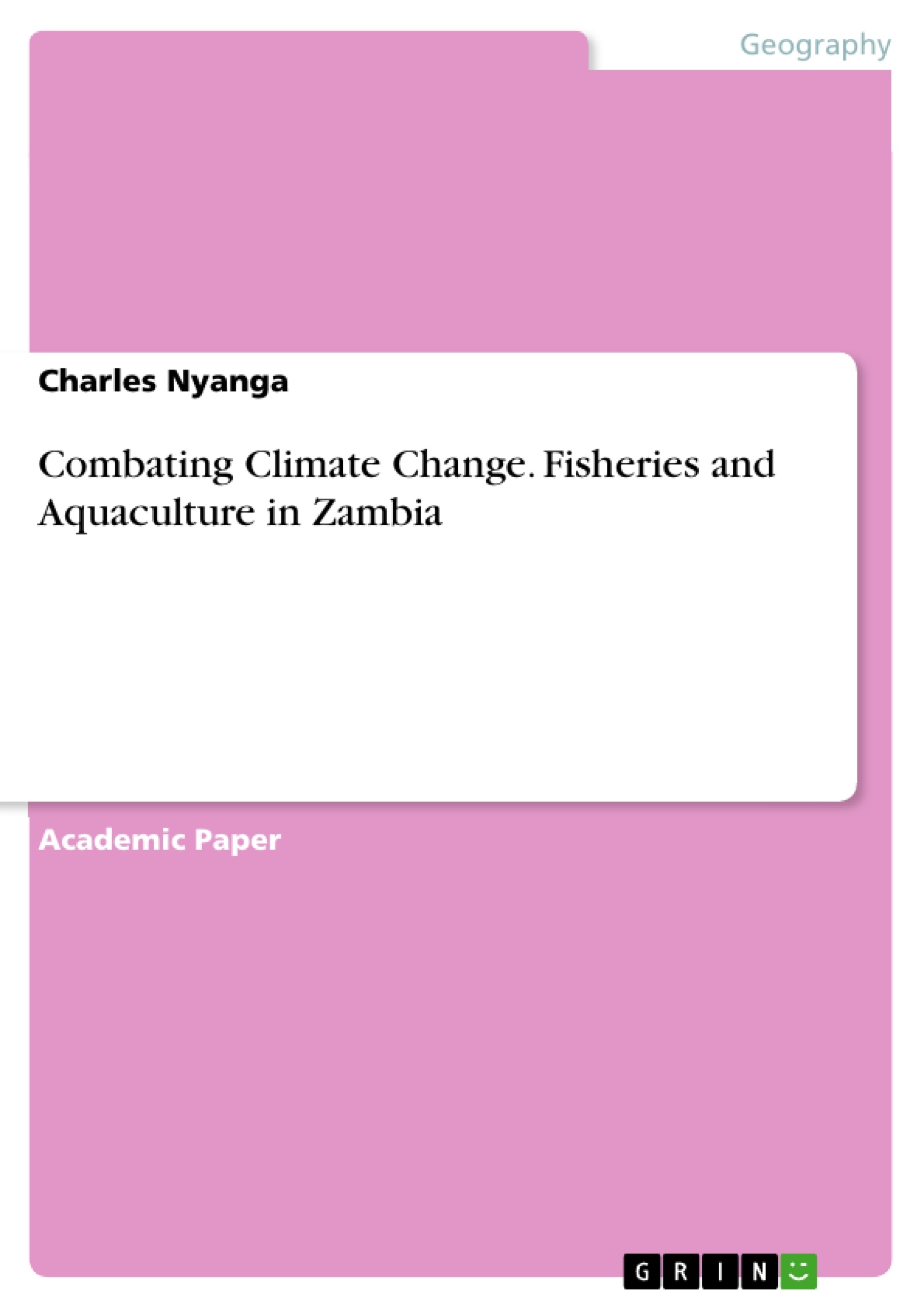This paper is a review of the impacts of climate change on fisheries in Zambia. Climate change has been having a remarkable impact in several areas. One of the areas is the area of fisheries and aquaculture. The author reviewed many papers written on the topic of aquaculture and fisheries. Zambia, like many other countries, have been facing many impacts from climate change. The paper aims to provide some suggestions on the solutions to combat climate change impacts.
The variability in climate has caused a lot of problems to both marine and fresh water aquatic ecosystems. These problems have spread to terrestrial ecosystems posing problems to fresh water aquaculture, forest ecosystems as well as agricultural ecosystems. Climate change has thus become a regional and global problem causing concerns over the preservation of these ecosystems for future generations. One of the results of climate change is global warming. It has been predicted that between 2010 and 2070 the world surface temperatures will increase by between 10 C to 2.70 C. This impact will affect the world economically, socially, environmentally and ecologically. This paper reviews works by experts as well as national and international organizations on impacts of climate change on aquaculture and fisheries in Zambia. It seeks to investigate the methods of mitigating and adapting to climate change which the Zambian government and stake holder organizations have put in place and may be able to put in place. Further the paper assesses the hindrances to adaptation and mitigation of climate change impacts in Zambia.
Inhaltsverzeichnis (Table of Contents)
- ABSTRACT
- INTRODUCTION
- POTENTIAL IMPACTS OF CLIMATE CHANGE ON FISHERIES AND AQUACULTURE IN SUB-SAHARAN AFRICA
- Climate change impacts on the environment and aquatic ecosystems in Zambia
- Climate change impacts on fisheries in Zambia
- Increase in average temperature
- Primary Production
- Other effects of climate change on fisheries in Zambia
- Climate change impacts on aquaculture in Zambia
- CLIMATE CHANGE ADAPTATION AND MITIGATION STRATEGIES
- Policy framework and civil society participation in Climate Change awareness
- Recommended climate change mitigation and adaptation strategies for Zambia and Sub- saharan Africa
- CONCLUSION
- ACKNOWLEDGEMENTS
- REFERENCES
Zielsetzung und Themenschwerpunkte (Objectives and Key Themes)
This paper reviews research findings on the impacts of climate change on aquaculture and fisheries in Zambia. It explores the methods used to mitigate and adapt to climate change implemented by the Zambian government and stakeholder organizations. The paper also analyzes the barriers to adapting and mitigating the impacts of climate change in Zambia.
- Impacts of climate change on fisheries and aquaculture in Zambia
- Climate change adaptation and mitigation strategies
- Role of the Zambian government and stakeholder organizations
- Challenges to climate change adaptation and mitigation
- Importance of fisheries and aquaculture to Zambia's economy and food security
Zusammenfassung der Kapitel (Chapter Summaries)
The introduction provides background information on Zambia's geography, population, and the significance of fisheries and aquaculture to its economy. The paper highlights the dependence on freshwater resources, the demand for fish consumption, and the role of fisheries in rural livelihoods. It also emphasizes the challenges of meeting the growing demand for fish while facing limited production.
The paper then delves into the potential impacts of climate change on fisheries and aquaculture in sub-Saharan Africa, specifically focusing on Zambia. It examines the effects of climate change on the environment and aquatic ecosystems, including increased average temperatures, impacts on primary production, and other effects on fisheries. It also explores the impacts of climate change on aquaculture in Zambia.
The chapter on climate change adaptation and mitigation strategies explores the policy framework and civil society participation in raising awareness about climate change. It then presents recommended strategies for mitigating and adapting to climate change in Zambia and sub-Saharan Africa.
Schlüsselwörter (Keywords)
The paper focuses on the impacts of climate change on fisheries and aquaculture in Zambia. It examines methods of adapting and mitigating the effects of climate change. The paper highlights the importance of freshwater resources, the role of fisheries in rural livelihoods, and the economic and food security implications of climate change impacts on these sectors. Key terms include wild capture fisheries, aquaculture, climate change, adaptation, and mitigation.
Frequently Asked Questions
How does climate change impact fisheries in Zambia?
Climate change leads to increased average temperatures and affects primary production in aquatic ecosystems, which disrupts both wild capture fisheries and freshwater aquaculture.
What is the economic significance of fisheries for Zambia?
Fisheries and aquaculture are vital for Zambia's economy and food security, particularly as a source of animal protein and a livelihood for rural communities.
What are the main strategies for climate change adaptation in Zambia?
Strategies include developing policy frameworks, increasing civil society awareness, and implementing specific mitigation techniques recommended for Sub-Saharan Africa.
What are the barriers to mitigating climate change impacts in Zambia?
The paper identifies various hindrances, including limited resources, the need for better policy implementation, and the challenges of adapting to rapid ecological shifts.
What is the predicted temperature increase for the region?
It is predicted that between 2010 and 2070, world surface temperatures could increase by 1.0°C to 2.7°C, significantly affecting ecological systems.
- Citation du texte
- Charles Nyanga (Auteur), 2016, Combating Climate Change. Fisheries and Aquaculture in Zambia, Munich, GRIN Verlag, https://www.grin.com/document/912136



